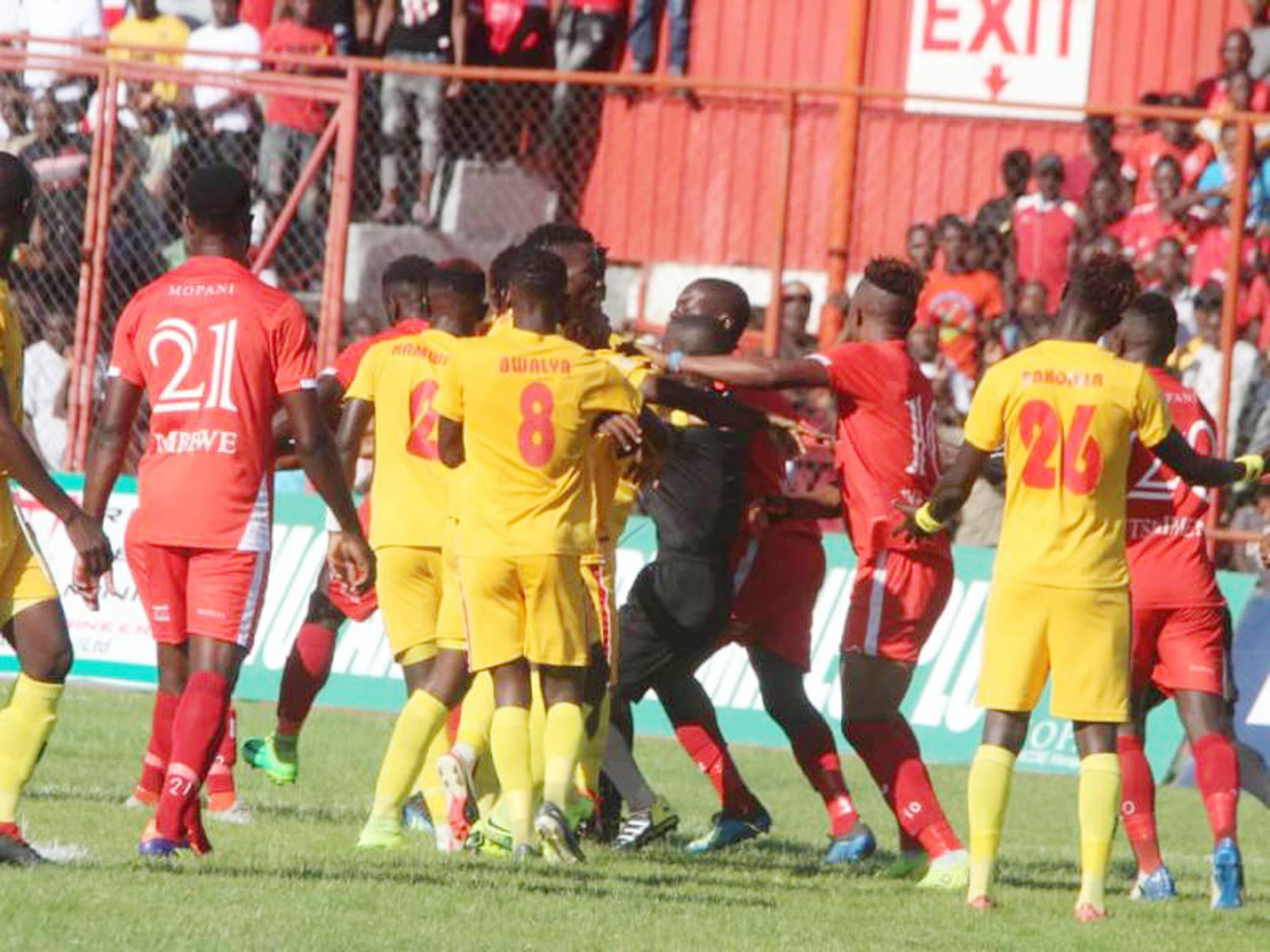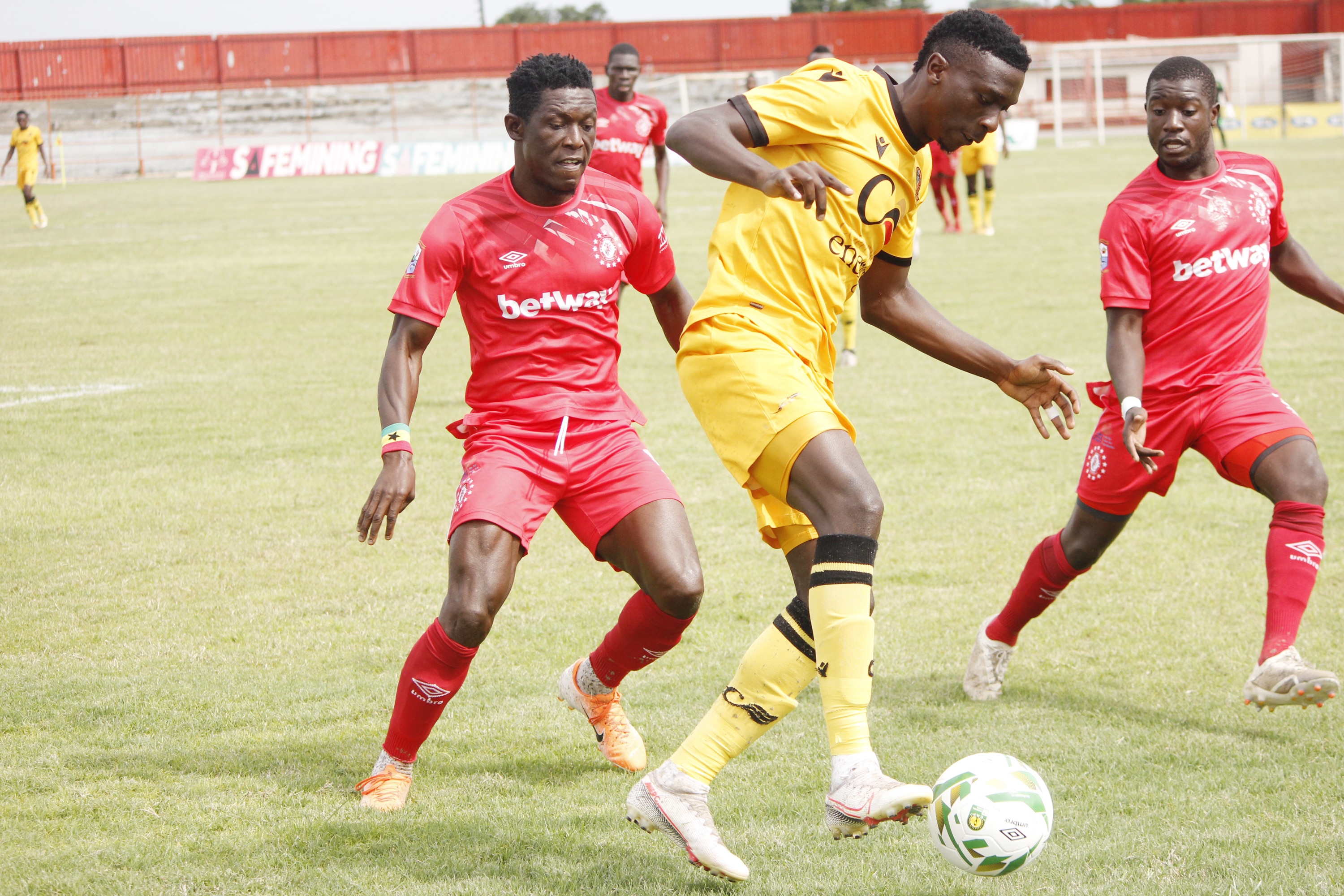Zambia’s biggest derby
The mining town of Kitwe is dominated by people in work suits, heavy boots, protective equipment and headgear. Mining is never far from the mind. Its people take their work seriously and have intense pride in being part of the Copperbelt, the thriving mining region that has dominated the Zambian economy for many years and now joined by the north-west where new copper fields are being developed.
This attitude has bred a different mindset from those who live in the capital city where accents, flash talk and appearance have an exaggerated importance in certain circles. In Kitwe, the language is direct. People get straight to the point and a wrong turn in conversation can easily lead to an immediate warning and, if need be, ‘corrective action.’ Balderdash is not taken lightly in these parts.
Similarly, football matters are taken with utmost seriousness here. None more so than when they involve the Power Dynamos-Nkana derbies that have, since the emergence of Power Dynamos in top-flight football in 1979, become the most coveted match to watch in Zambian football.
The emergence of Power Dynamos, following the terminal decline of City of Kitwe in Miseshi, and the fall of Kitwe United into the lower ranks of the then second division, created a vacuum with Nkana standing alone as Kitwe’s football powerhouse. For those not inclined to support the Wusakile team, Power Dynamos gave them an alternative and an attractive one at that.
The Kitwe derby was born in 1979. Before that, the dominant match in Zambian football shifted depending on which teams were dominating the landscape. In the sixties, the Mufulira Wanderers attacking brand of football won hearts across the country. They would be challenged by the emergence of a Kabwe Warriors team that didn’t hesitate to bring in players from other parts of the country. The arrival of ‘Ucar’ Godfrey Chitalu cemented their place as the leading team of the early seventies. There were titanic battles between the two. From the mid to late seventies, Zambia Army, later Green Buffaloes, took over the mantle and it was Buffaloes – Wanderers ties that drew fans in their thousands to Shinde and Independence stadia for euphoric encounters as the army stormtroopers clashed with the twinkle-toed mining team that delighted audiences wherever they played.
When Power Dynamos assembled their cast of high cost, high profile players and in a short time changed the face of Zambian football with their revolutionary project, they created a derby that would stand the test of time and dominate the Zambian football landscape for the next four decades, now running into a fifth.
In the early days, the gladiators on both sides were worthy of the sobriquet. A look at the teams that clashed in heady battles reflects the quality of players on display that could easily have matched any national team had they been selected from just these two sides. While Nkana would go on to dominate the league, particularly from 1982 – 1990 when they won it in eight out of eleven years, Power Dynamos had tremendous cup runs in the domestic cups and reached two continental finals becoming runner-up and African champion respectively.
In goal, Blackwell Chalwe of Power Dynamos and Joshua Longwe of Nkana were two goalkeepers who fell just short of national team standard but were highly competent choices.
The defensive walls of Joseph Mwewa, Edwin Kanyanta, Francis Mutembo and Michael Musonda
were closely matched to that of John Kalusa, Kapambwe Mulenga, Ben Bamfuchile and Fighton Simukonda, though Nkana had a slight edge at being a little more robust and coordinated.
In midfield, Jericho Shinde and Dominic Mutale contested the middle of the park for Nkana, with Chris Mtonga and Stafford Mtalama the Dynamos duo. This again was an area more closely matched, but again tilting ever so slightly in Nkana’s favour.
It was in attack, however, that Power Dynamos’ dominance showed. Lucky Msiska, Wisdom Chansa, Alex Cola and Peter Kaumba had a distinct edge over Jerry Kaoma, Michael Chabala, James Njengela and Golden Kazika.
Matches between the two sides brought to the fore peculiarities. Home form or league standing was never an indicator of which way the derby would go. Sometimes, home advantage tended to be something of a handicap as the expectations of the home fans and the pressure from the crowd, when things were not going well, tended on occasion, to suppress the home team.
In 1985, as Power Dynamos sought to retain the league title they had won a year earlier, they succumbed on the final day of the season to Nkana, losing 2-0 at the Arthur Davies Stadium, allowing Nkana to win at the final hurdle.
While encounters between the two tended to be close outcomes, there were times when the dominance of one team was indisputable. At the end of the eighties, Nkana overran a Power Dynamos team in turmoil after some internal strife by a significant 4-0 margin.
Similarly, when Nkana was at its lowest, burdened by financial difficulties, a Power Dynamos team led by the mercurial Joseph Sitali systematically took them apart in a memorable 5-1 win on 19 May 2012, that had the Wusakile faithful seething with rage. At such times, Nkana players needed to tread wearily and to disappear from the public eye until the anger simmered down.
On 16 February 2019, Power Dynamos cult-favourite Alex Ng’onga won a permanent place in the hearts of the Power Dynamos faithful when he led the scoring in a 0-2 win and in typical fashion, contrived to get himself sent off for a physical confrontation that saw his shirt ripped to shreds. As he left the field applauding to the outnumbered yellow-clad fans in the terraces at Nkana stadium he had earned himself a place in Power Dynamos folklore.
Ironically, this season, having been discarded by Power Dynamos during a period in which he caused more trouble than goals scored, he was allowed to leave at the end of his contract. He resurfaced at rivals Nkana where, after a 3-0 defeat on their home turf earlier in the season, the Wusakile club rapidly sliding down the table into a relegation battle looked down and out.
His arrival revitalized a team in terminal decline and in the return fixture he scored as Nkana ran out 2-0 winners at the Arthur Davies Stadium with Power Dynamos fans shaking their heads in bewilderment.
Other players who have played for both sides in the Derby include Kapambwe Mulenga, Freddie Mwila Jr, Douglas Chiwaya, and Allan Chibwe.
Coaches have also crossed the divide to work for both sides and sitting on the bench close to the fence at Arthur Davies stadium has proved to be a harrowing experience for those who did so as fans are not afraid to colourfully make their feelings known. Similarly at Nkana, coaches have
sometimes needed police escort for their own good. Beston Chambeshi, Guston Mutobo and Ben Bamuchile have all felt the wrath of both sets of fans when derby results went against them.
The terraces are where, unlike the on-field duels, the dominance tends to tilt comprehensively on one side. The Wusakile faithful heavily outnumber the equally passionate but significantly smaller yellow fan base, a result of the variance in size of the mining community, the longer history of Nkana and the long dominance of the league championship in the eighties and early nineties.
Running into five decades after the first derby was played, the passions continue to inflame both sets of fans. In the week running into the biggest match in Zambian football and on Derby Day itself, Kitwe becomes a kaleidoscope of red, white and yellow, with the common colour – red – dominating. The see-saw battle for supremacy continues and looks set to remain the pre-eminent event of the domestic football calendar for many more years to come.
By Ponga Liwewe, Times of Zambia, Friday, 25 June 2021



